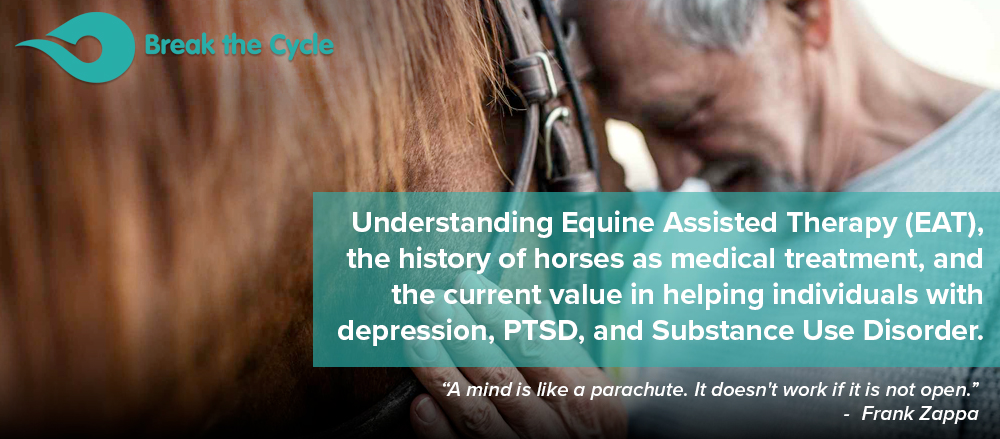
For centuries, horses have been used as part of medical treatments and to assist in psychotherapy. From helping veterans in their treatment for Post Traumatic Stress Disorder (PTSD) to being included in the curriculum for medical students at Stanford University, the therapeutic role of horses is well-established in today’s treatment landscape. Equine Assisted Therapies have proven to be effective in treating various conditions.
Animal-assisted interventions (AAIs) is a term that is commonly used to describe any modality using animals to improve the physical, mental, and social conditions of humans. These interventions have proven effects in applications for autism spectrum disorder, Alzheimer’s disease, behavioral disorders & substance use disorder, and emotional well-being. Other medical issues in which this therapy has been applied include Parkinson’s disease, heart failure, cerebral palsy, and neurological impairments and applications for children with developmental delays. (Mendonça T, Bienboire-Frosini C, Menuge F, Leclercq J, Lafont-Lecuelle C, Arroub S, Pageat P. The Impact of Equine-Assisted Therapy on Equine Behavioral and Physiological Responses. Animals. 2019; 9(7):409. https://doi.org/10.3390/ani9070409)
Animal-assisted therapy, especially equine-assisted activities and therapy (EAAT), has been used as a strategy to improve health conditions and quality of life for patients with chronic conditions and to assist individuals in developing coping skills. Evidence suggests that EAAT and the formation of the human-animal bond that occurs during the sessions can produce cognitive, psychological, and cardiovascular benefits. Best known as an intervention popular among military veterans, equine-facilitated intervention is grounded in the concept of extra sensitivity of prey animals, compared to other animals such as cats and dogs, to affective congruity, body language, and expressed emotion, which is thought to be a useful therapy tool. (Chakales, P. A., Locklear, J., & Wharton, T. (2020). Medicine and Horsemanship: The Effects of Equine-assisted Activities and Therapies on Stress and Depression in Medical Students. Cureus, 12(2). https://doi.org/10.7759/cureus.6896)
In 2020, 40.3 million Americans recorded a past year substance use disorder (SUD), yet only approximately one-tenth of this number received any specialty treatment. Among those who do engage in SUD care, retention is uncertain and dropout rates across in-person psychosocial treatments average 30.4%. Given the documented positive association between time in treatment and improved outcomes for individuals with SUD, there is a need to identify interventions that can be used to increase treatment motivation, retention, and remission.
One potential avenue for such interventions is equine-assisted therapy (EAT) or equine-assisted services (EAS). EAS is a unifying term that captures all services where professionals incorporate horses (or equines) to benefit people. Of particular interest are psychotherapies incorporating equines, such as equine-assisted psychotherapy (EAP) and equine-facilitated psychotherapy (EFP). With these novel and complementary approaches to psychotherapy, the horse serves as a supporter of psychotherapeutic interventions as well as a mediator between psychotherapist and client. In this therapeutic triad (client-horse-therapist), by prompting specific behaviors and serving as a metaphor for understanding internal experiences, the horse facilitates personal exploration and provides a context for interpreting client difficulties. Horses may be suited for this therapeutic role due in part to a keen awareness of and sensitivity to nonverbal communication. Horses’ automatic responses to client behaviors provide valuable information that can inspire client insight and self-awareness. Additionally, horses are claimed to be well-positioned due to their powerful physical attributes and the resulting emotions they stir in people.
The implementation of equines during treatment for psychological disorders has been frequently documented. Following EAS, participants have reported significant reductions in symptoms of psychological distress, hyperactive behaviors, violent behaviors, post-traumatic stress disorder (PTSD), and anxiety.
In line with this developing body of research, there have been media reports of incorporating equines into SUD treatment. However, while some individuals have indicated a beneficial effect of EAS on substance misuse, few studies have provided experimental/non-anecdotal support for their effectiveness on the recovery process. One study evaluating the efficacy of an EAS intervention for treating anxiety and PTSD found a significant reduction in alcohol use among participants. (Diaz, L., Gormley, M.A., Coleman, A. et al. Equine-assisted services for individuals with substance use disorders: a scoping review. Subst Abuse Treat Prev Policy 17, 81 (2022). https://doi.org/10.1186/s13011-022-00506-x)
For more information on Equine Assisted Therapy in Volusia County visit, https://www.healingheartstherapies.com/equine-therapy.
See below for more articles related to therapies for PTSD and SUD.
